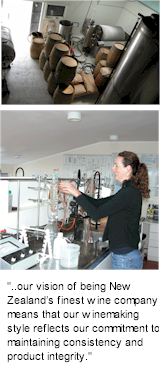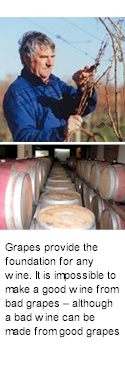


Today Babich is one of New Zealand's largest family-owned wine companies. Babich Wines' strongly-held winemaking philosophy lies at the heart of their approach to producing interesting wines.

A number of viticulture techniques are used to improve grape quality. These include thinning grapes to improve quality and flavour. Removing some of the leaves exposes grapes to more sun, thus enhancing ripening and flavour development. All vineyards in which Babich have an interest are situated on free-draining soils. Computer controlled irrigation systems are therefore employed to maintain vine health and maximise grape quality.
Decisions on harvesting are made by the winemakers and viticulturists and can be influenced by weather, and the wine style envisaged. Small crops of the highest quality grapes might be hand-harvested into small bins and whole bunch pressed, whereas mechanical harvesters are employed for larger volumes or to beat threatening weather.
Auckland is the base of many New Zealand wineries and is still the country's 7th most heavily planted wine region. Chardonnay and premium red varieties such as pinot noir and pinotage flourish in the relative warmth and the loam-clay soils of Babich Wine's 28 HA vineyard in Henderson. Hawke's Bay has a tradition of quality table winemaking stretching back to the nineteenth century. The region is blessed with a superb climate for viticulture, being sufficiently cool to ripen grapes slowly, yet warm and sunny enough to promote optimum fruit ripening.

The Hawke's Bay region has built up an outstanding reputation for its deep-flavoured, slowly evolving chardonnays, robust, tropical sauvignon blancs and stylish, scented cabernet and merlot-based reds. In recent times it has become renowned for varieties like gewurztraminer, pinotage and syrah. The 16 hectare Fernhill Vineyard, planted in light sandy-loam soils, enjoys sheltered, warm conditions perfect for ripening grapes with elegant fruit flavours.
The 38 hectare Gimblett Road Vineyard, planted in exceptionally free-draining shingle country yields small crops of grapes harbouring rich, concentrated flavours. Combining the French concept of terroir with modern day thinking to define, protect and market wine, Gimblett Gravels has created a designation of their district according to a tightly specified soil type. The gravely soils laid down by the old Ngaruroro River, which were exposed after a huge flood in the 1870's, make the Gimblett Gravels distinctive. In summer and autumn, the district is up to three degrees Celsius warmer during the day compared with most other areas in the Hawke's Bay. The evenings are also warmer because of thermal conductivity in the stony soils.
Many of New Zealand's most fragrant, flavoursome wines originate in the pebbly, flat plains of the Marlborough region. Abundant sunshine and a dry autumn climate enables Marlborough-grown sauvignon blanc, riesling, pinot gris and pinot noir to benefit from a long, slow, ripening period that intensifies flavours. Marlborough is the world's leading cool climate wine region. Babich Wakefield Downs Vineyard in the Awatere Valley is located on a terraced site above the Awatere River. This particularly free-draining site has a frost-free microclimate that is ideal for grape growing.
The Cowslip Valley Vineyard in the Waihopai Valley lies on a gentle rise. Its deep gravely soils provide an ideal site for sauvignon blanc, pinot gris, riesling and pinot noir. Grapes sourced from the heavier soils of the Selmes Road Vineyard in the Wairau Valley are ideal for blending with grapes grown on lighter, gravely soils. These soils are particularly suited to sauvignon blanc, pinot gris and pinot noir.
